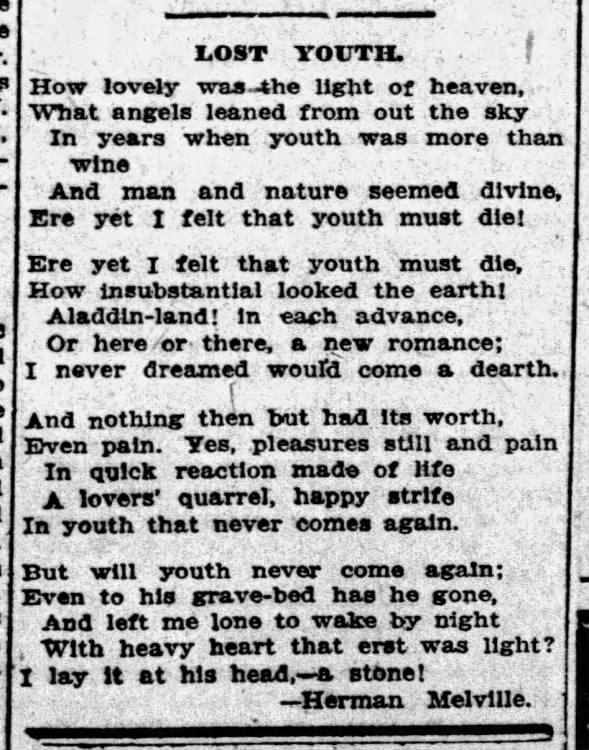 |
| Samuel Taylor Coleridge via NYPL Digital Collections |
Herman Melville's poem "C——'s Lament" from Timoleon, Etc. (1891) appeared in the Sunday edition of the Springfield, Massachusetts Republican on June 13, 1909 under a different title, "Lost Youth."
 |
| Springfield MA Sunday Republican - June 13, 1909 via Genealogy Bank |
Reprinted with the same title in the Burlington, Vermont Free Press on June 18, 1909, and again in the Burlington Weekly Free Press on June 24, 1909. The poem "Lost Youth" by Herman Melville was also reprinted in the Davenport, Iowa Democrat and Leader on June 25, 1909.
 18 Jun 1909, Fri The Burlington Free Press (Burlington, Vermont) Newspapers.com
18 Jun 1909, Fri The Burlington Free Press (Burlington, Vermont) Newspapers.comLOST YOUTH.
How lovely was the light of heaven,
What angels leaned from out the sky
In years when youth was more than wine
And man and nature seemed divine,
Ere yet I felt that youth must die!
Ere yet I felt that youth must die,
How insubstantial looked the earth!
Aladdin-land! in each advance,
Or here or there, a new romance;
I never dreamed would come a dearth.
And nothing then but had its worth,
Even pain. Yes, pleasures still and pain
In quick reaction made of life
A lovers' quarrel, happy strife
In youth that never comes again.
But will youth never come again;
Even to his grave-bed has he gone,
And left me lone to wake by night
With heavy heart that erst was light?
I lay it at his head,—a stone!-- Herman Melville.
Along with the different (editorially revised?) title "Lost Youth," punctuation also differs in these 1909 newspaper versions from that of most printed texts including the 1924 Constable edition of The Works of Herman Melville, volume 16. There as in Timoleon the last line reads
O, lay it at his head—a stone!
but the 1909 versions have the singular first-person pronoun "I" in place of the interjection:
I lay it at his head,—a stone!
The change from "O" to "I" in the final stanza affects the mood of the verb "lay," making it declarative instead of imperative, parallel with the "I" statements that close the first two stanzas.
In manuscript, earlier versions of the title read "Coleridge's Lament," as reported in the editorial notes for this poem in the back of the 2009 Northwestern-Newberry edition of Melville's Published Poems, edited by Robert C. Ryan, Harrison Hayford, Alma MacDougall Reising, and G. Thomas Tanselle, with Historical Note by Hershel Parker.
Alternatively, in manuscript, titled "Anacreon's Threnody," as Douglas Robillard pointed out in the introduction to his edition of The Poems of Herman Melville (Kent State University Press, 2000).
- Melville poem Lost Youth in the Christian Register
https://melvilliana.blogspot.com/2021/05/melville-poem-lost-youth-in-christian.html

No comments:
Post a Comment